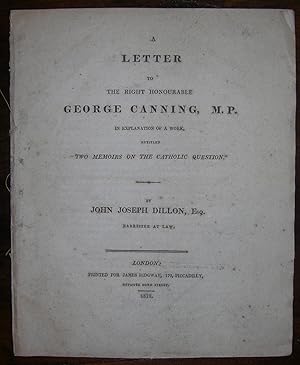Descripción
DILLON, Sir John Joseph (died 1837). A Letter to the Right Honourable George Canning, M.P. in Explanation of a Work. Entitled "Two Memoirs on the Catholic Question." London: Printed for James Ridgway, 1812. Folio (10 2/8 x 8 4/8 inches). 20 pages, number 1-18 (disbound). Concerning the issue of Catholic emancipation, which was regularly considered in the Kingdom of Great Britain and Ireland in the late 18th century and early 19th century, and which involved a discussion of the restrictions on Roman Catholics introduced by the Act of Uniformity, the Test Acts and the penal laws, which, amongst other restrictions, required that Catholics renounce the temporal and spiritual authority of the Pope and transubstantiation. Crisis came in 1800 with the Act of Union between Great Britain (Protestant) and Ireland (Catholic). Since taking his seat in parliament in 1809, Sir Robert Peel worked hard against making any political or constitutional concessions to Catholics, and from 1812 to 1818 he was Chief Secretary for Ireland in Lord Liverpool's government. But the issue was kept alive by Henry Grattan, who returned to politics as MP for the English constituency of Malton, then from 1806-1820 as one of the Members for the city of Dublin. In May 1808 Grattan proposed emancipation in the House of Commons, with certain qualifications, but his motion was defeated by 281 votes to 128. In June 1812 the Commons accepted, by 225 votes to 106, a motion in favour of considering Catholic claims. An emancipation Bill, introduced in February 1813, received a second reading but was lost in committee by a narrow margin. It was not until the King s Speech of February 1829 that a promise of Catholic relief was included, and a Bill was introduced in the Commons a month later. It passed through both Houses of Parliament with little trouble and received Royal Assent in April. George Canning, served as Prime Minister for the last 6 months of his life, but he had a long career as a politician, and in May of 1812 the assassination of the then prime minister, Lord Liverpool, gave Canning, "who had been toying with opposition, another chance of major office. Jenkinson, who had succeeded his father as Lord Liverpool, was eventually confirmed as prime minister, and in July set about capturing Canning. He promoted a reconciliation between him and Castlereagh, who offered to surrender the Foreign Office but insisted on retaining the leadership of the House of Commons. Canning, egged on by his friends, rejected the offer as humiliating. He had overreached himself again. A general election was called at the end of 1812 in which Canning stood and was elected for Liverpool, free of expense. This was a landmark in his career and in the history of his party" (Derek Beales for DNB). Catalogued by Kate Hunter. N° de ref. del artículo 72lib1326
Contactar al vendedor
Denunciar este artículo
![]()
